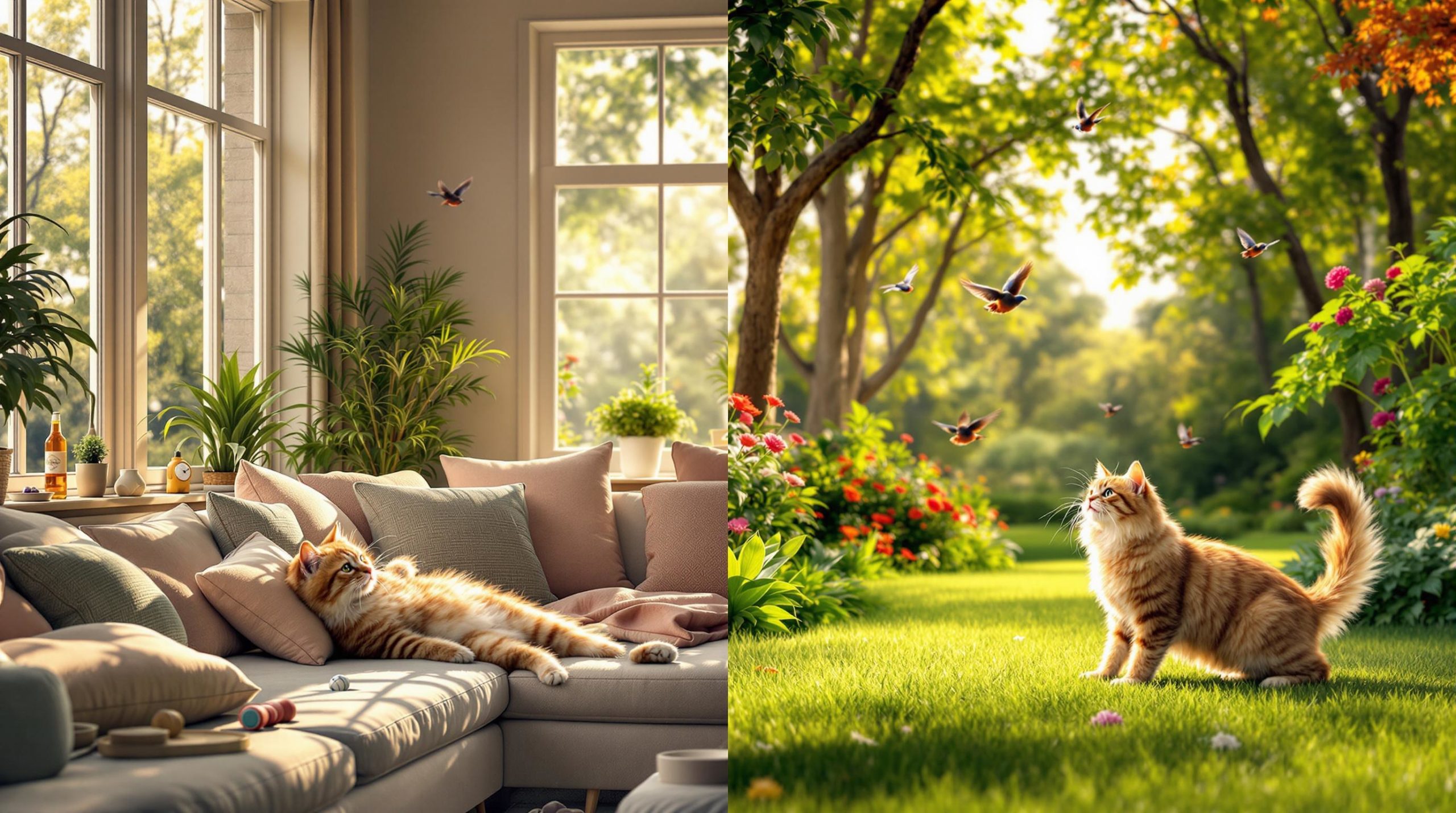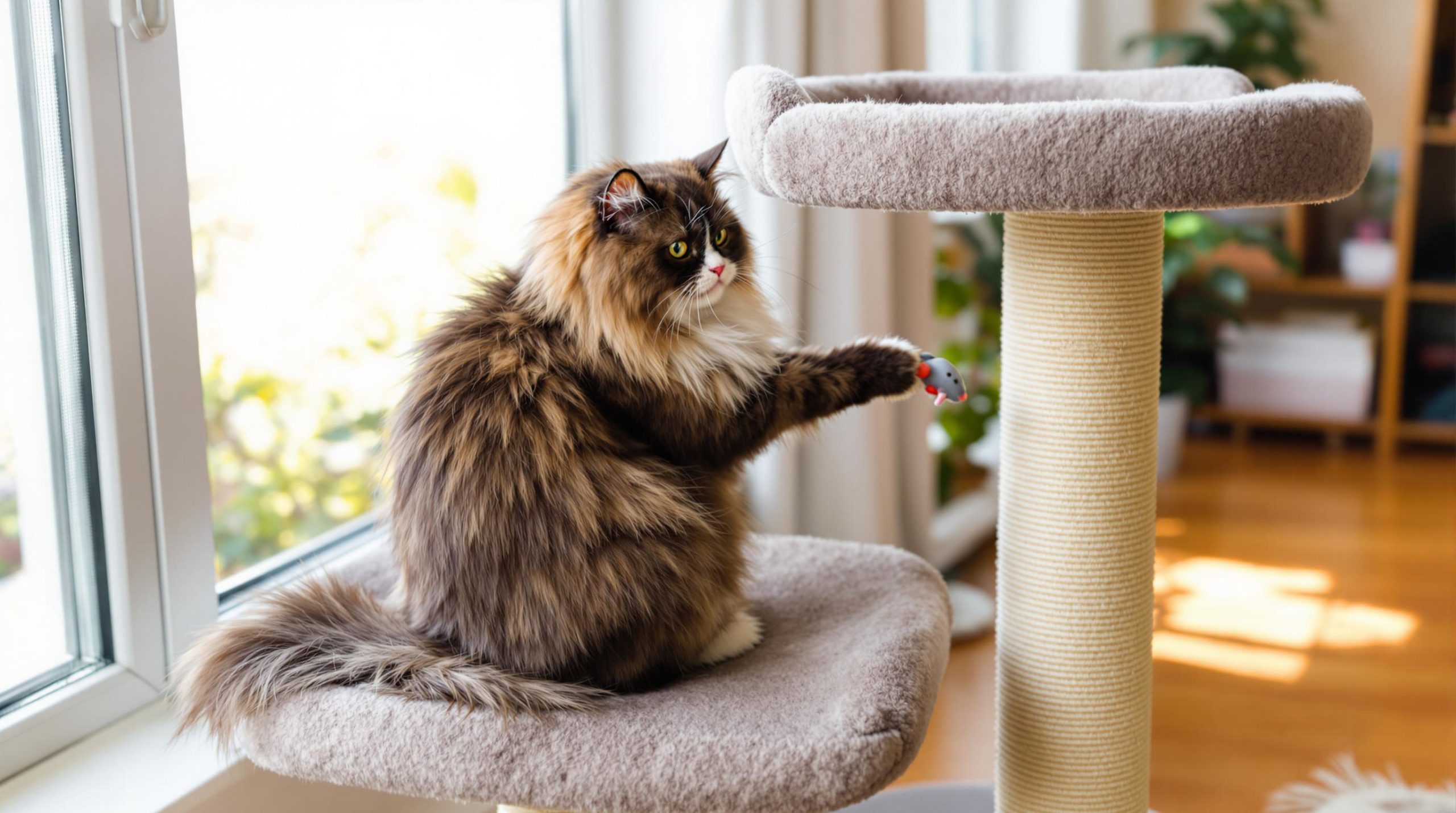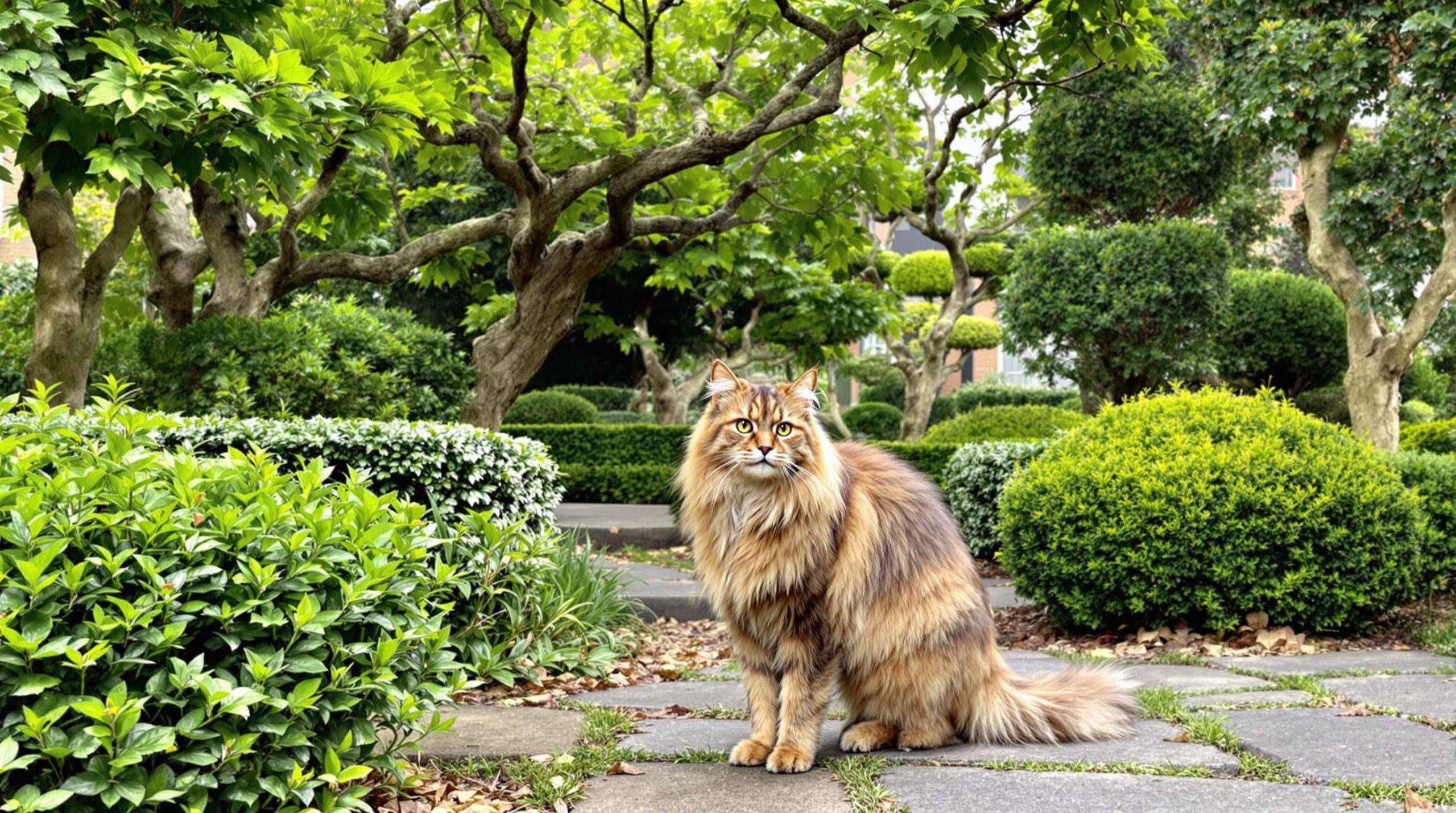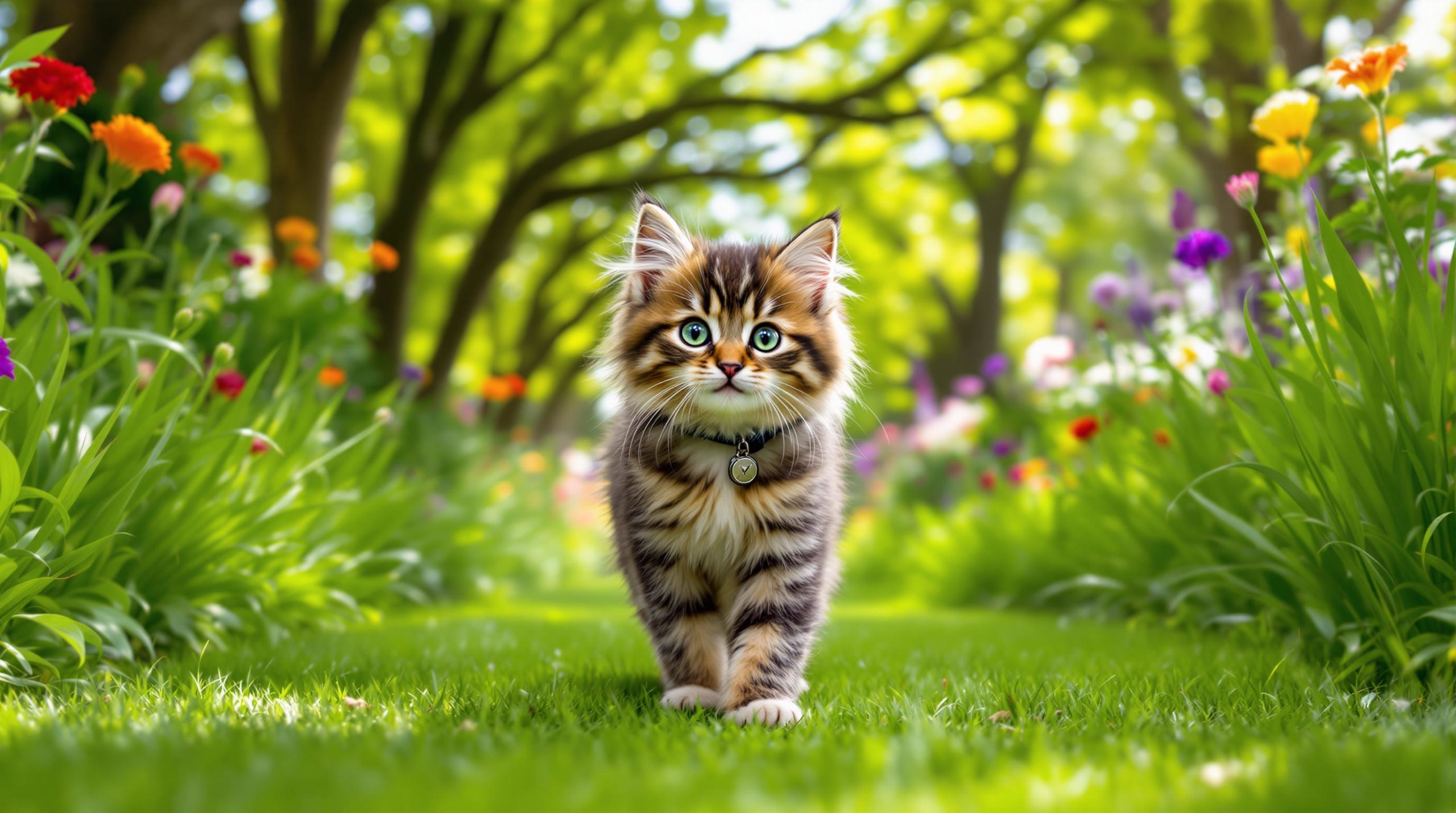Indoor vs outdoor maine coon: which environment is best for your cat?

The majestic Maine Coon—known for its impressive size, luxurious coat, and gentle temperament—poses a delightful yet challenging question for cat owners: should these gentle giants thrive indoors in a secure, controlled environment, or revel in the boundless freedom of the outdoors? As we navigate this inquiry, it becomes clear that both indoor and outdoor environments offer quite different experiences that shape the cat’s health, behavior, and overall well-being. Unpacking the essential elements of pet environment, cat care, and feline health, will help clarify which lifestyle best suits these robust companions, taking into account their natural instincts and the modern challenges they face. From safeguarding against predators and diseases to encouraging natural instincts and mental stimulation, every choice comes with its own blend of risks and rewards.
Adjusting to contemporary life demands a nuanced approach in deciding the best setting for your Maine Coon. The balance between pet safety and cat enrichment is at the heart of this debate, as owners seek to nurture not only a healthy but also a joyful and fulfilled feline friend. Whether your Maine Coon is frolicking in the garden or lounging amidst cozy indoor furnishings, understanding the unique requirements of these magnificent cats will pave the way to making an informed and compassionate decision for their happiness and longevity.
Benefits and Challenges of Keeping Maine Coons as Indoor Cats
Keeping a Maine Coon indoors offers numerous advantages that address vital safety and health concerns for these large, sociable felines. Historically, Maine Coons adapted to rugged environments and roving outdoor lifestyles, but modern times introduce a medley of new hazards that can threaten their well-being if left unsupervised outside.
Enhanced Safety from Predators and Traffic
One of the most compelling reasons to keep Maine Coons indoors is protection from common outdoor threats, such as predators and traffic accidents. Unlike some other breeds, Maine Coons’ large size and friendly temperament make them vulnerable to predatory attacks by coyotes, stray dogs, or birds of prey. Pursuing an adventurous spirit can unwittingly lead them into dangerous encounters or tragic road accidents. Indoor habitats offer a sanctuary safe from these risks, where cats can roam without fear and owners enjoy peace of mind.
A Controlled and Poison-Free Environment
Indoor living provides a secure setting free from various toxic agents outdoor cats may accidentally ingest. Items such as poisonous plants, rat poison, or toxic human foods can be fatal without timely intervention. Maine Coons are curious explorers and may often investigate unknown substances, making indoor confinement a preventive measure against accidental poisonings.
Reduced Exposure to Disease and Parasites
Outdoor cats face higher risks of infectious diseases like feline leukemia virus (FeLV) and feline immunodeficiency virus (FIV), as well as parasitic infestations from ticks and fleas. By maintaining your Maine Coon indoors, the likelihood of contracting these illnesses reduces significantly. Regular monitoring and veterinary care remain essential, but a pet confined to a clean indoor environment tends to have a healthier, longer life supported by fewer veterinary interventions.
Mitigation of Separation Anxiety and Behavioral Issues
Maine Coons form affectionate bonds with their human families and may exhibit separation anxiety if left alone for extended periods or if exposed to unfamiliar or threatening outdoor stimuli. Indoor environments minimize chances of traumatic incidents such as being lost or stolen. Furthermore, controlled surroundings help reduce stress-induced behaviors, such as excessive scratching, aggression, or inappropriate elimination.
Challenges of Indoor Living
Despite the protective advantages, indoor cats may face challenges such as boredom, limited exercise, and weight management issues. Maine Coons require substantial stimulation to remain mentally and physically healthy. Owners must invest in enriching activities including interactive toys, climbing structures, and puzzle feeders to simulate hunting behaviors and keep their feline active and entertained. Without such engagement, Maine Coons risk lethargy and obesity, which can escalate into chronic health problems.
| Benefit of Indoor Living | Explanation |
|---|---|
| Protection from predators and accidents | Eliminates threats posed by wild animals and traffic hazards common outdoors. |
| Safer environment free from toxins | Prevents ingestion of poisonous plants, rat bait, and harmful human food. |
| Lower risk of infectious diseases | Reduces exposure to viruses like FeLV, FIV, and parasitic infestations. |
| Reduced separation anxiety | Maintains close bond with owners without risk of getting lost or stolen. |
| Behavioral control with proper enrichment | Stimulates mental and physical health through toys and play, avoiding boredom. |
- Provide multiple scratching posts to satisfy natural claw maintenance.
- Create vertical spaces like cat trees to simulate climbing.
- Use puzzle feeders to engage hunting instincts and delay feeding.
- Regular interactive playtime with feather wands or laser pointers.
- Access to sunlit window perches for comforting outdoor views.
Understanding Maine Coon health problems helps owners prepare for proper care indoors and minimize risk factors linked to their environment.

Unlocking the Natural Adventurer: Advantages of Outdoor Life for Maine Coons
While indoor living offers undeniable safety, Maine Coons possess a wild streak inherited from their origins in the dense forests of North America. An outdoor environment provides stimulating challenges and physical benefits that contribute significantly to their feline health and natural behavior exhibition.
Mental Stimulation and Sensory Enrichment
The outdoor world bursts with novel encounters: new scents, sounds, sights, and textures that ignite a Maine Coon’s curiosity and sharpen cognitive skills. Navigating complex environments engages problem-solving abilities, elevating their overall intelligence. This type of environmental variety helps prevent behavioral issues related to boredom or stress often seen in indoor confinement.
Physical Exercise and Claw Maintenance
Outdoor roaming offers spontaneous and diverse physical activity—climbing trees, chasing prey, and sprinting across open spaces. Such natural exercise regimes keep Maine Coons fit, preserve muscle tone, and support cardiovascular health. It also assists with trimming nails naturally through regular activity on rough outdoor surfaces, lowering the need for human-assisted grooming.
Natural Instinct Expression and Territory Marking
Outdoor cats engage in instinctual behaviors such as hunting, patrolling, and territorial marking. Though Maine Coons are typically sociable and less territorial compared to other breeds, scratching and scent marking outdoors fulfills essential communication needs, preventing frustration and destructive scraping indoors.
Stronger Immune System Through Controlled Exposure
Supervised outdoor access can enhance immunity by exposing Maine Coons to a varied micro-ecosystem. However, such benefits come with the cost of potential disease exposure, so rigorous vaccination and parasite prevention are critical. In many cases, allowing outdoor time in controlled environments or secure enclosures combines advantages of both worlds.
Risks and Precautions of Outdoor Living
The excitement of the great outdoors brings inherent risks such as traffic, predation, theft, and disease. Many cats succumb to these dangers, making owner supervision and education vital. To mitigate these, strategies include leash training, microchipping, and constructing safe outdoor enclosures (“catios”) providing the sights and sounds of nature without its hazards.
| Benefit of Outdoor Living | Details |
|---|---|
| Enhanced mental stimulation | Varied sensory experiences boost curiosity and intelligence. |
| Natural physical exercise | Encourages muscle strength, cardiovascular fitness, and healthy claw maintenance. |
| Expression of natural behaviors | Supports hunting instincts, territorial marking, and scratching. |
| Potentially stronger immune system | Exposure to environmental microbes helps develop disease resistance. |
| Increased risk of accidents and illness | Risks from traffic, predators, infections, and theft require management. |
- Train your Maine Coon to wear a harness and leash for supervised walks.
- Ensure vaccinations for rabies, distemper, and feline leukemia are up to date.
- Use microchips for identification in case your cat wanders too far.
- Build or purchase outdoor enclosures or catios for safe exploration.
- Provide climbing trees or natural elements in the garden to enrich outdoor play.
Discover more about how to minimize local wildlife risks such as encounters with raccoons and other neighborhood animals that might pose a threat.

Combining Indoor Comfort and Outdoor Excitement: The Ideal Pet Environment for Maine Coons
Owners increasingly aspire to provide their Maine Coons with the best of both worlds, striking a harmonious balance between pet safety and cat enrichment. Designing a hybrid lifestyle can maximize health benefits while minimizing potential dangers.
Structured Outdoor Time and Safe Exploration
Allocating specific periods for outdoor activities, whether on leash or within secured enclosures, lets the cat savor the outdoors’ joys without constant risk. This approach satisfies their exploratory urges while ensuring supervision. Catios, which are enclosed outdoor pens, create a stimulating environment with fresh air, sunlight, and natural sounds, all while protecting from predators.
Indoor Environment Designed for Activity
When indoors, Maine Coons require sufficient space to roam and engage in play that mimics natural hunting patterns. Multiple vertical climbing shelves, scratching posts, and interactive toys are vital. Regular play sessions keep their muscles toned and minds sharp. Access to window perches overlooking bird feeders adds an enriching visual stimulus.
Implementation of a Diverse Nutrition Plan Supporting Health
A well-balanced diet rich in animal proteins and appropriate fats supports the Maine Coon’s robust body and high energy needs. Specialized, quality cat food options that prioritize natural ingredients free from allergens contribute to sustained feline health, especially when outdoor hunting opportunities are limited. The brand Untamed offers vet-formulated meals containing high-quality proteins suited to Maine Coons’ dietary requirements.
Benefits of Routine Veterinary Care and Monitoring
Irrespective of living environment, maintaining regular health checks, vaccination schedules, and parasite prevention ensures your Maine Coon remains in top form. Vigilance in observing behavior or physical changes allows prompt veterinary interventions when needed. Proactive care prevents common ailments seen in both indoor and outdoor cats.
| Hybrid Pet Environment Features | Benefits |
|---|---|
| Supervised outdoor play sessions | Provides mental stimulation and physical exercise safely. |
| Indoor enrichment with climbing and scratching furniture | Prevents behavioral issues and promotes activity. |
| High-quality nutrition tailored to Maine Coons | Supports energy needs and reduces allergic reactions. |
| Regular vet visits with parasite prevention | Early disease detection and improved overall health. |
| Use of microchips and safety collars | Increases a cat’s safety during outdoor excursions. |
- Invest in interactive toys and rotate them frequently to maintain interest.
- Schedule engaging outdoor playtime during calm weather conditions.
- Customize nutrition plans considering Maine Coon’s age and health status.
- Consider comfort items indoors that replicate outdoor textures, such as grass mats.
Explore detailed exercise needs for Maine Coons to tailor your cat’s daily activity regimen.
Essential Pet Accessories and Training For Safe Outdoor Adventure of Maine Coons
Ensuring a secure and enjoyable outdoor experience for Maine Coons requires more than willingness; it demands thoughtful preparation and the selection of appropriate pet accessories and training approaches tailored to their unique personalities and physicality.
Leash Training: Opening Doors to Controlled Exploration
Training a Maine Coon to wear a harness and walk on a leash is an excellent way to grant controlled access to the outdoors. Starting with positive reinforcement such as treats and gentle encouragement helps them associate the harness with fun. This method transforms walks into enriching experiences without compromising safety or freedom.
Microchipping and Identification
A microchip provides a permanent form of identification that aids in recovery if a cat strays or gets lost outdoors. Coupled with collars equipped with ID tags, these tools are vital components ensuring your Maine Coon’s return in case of separation. Registering the microchip with up-to-date contact information is crucial for effectiveness.
Building Safe Outdoor Enclosures (Catios)
Catios deliver the benefits of outdoor exposure inside a fenced or netted area, keeping your pet protected from predators and traffic. Equipped with climbing platforms, scratching posts, and weather protection, catios provide a stimulating space where your Maine Coon can observe the natural world safely. These enclosures help prevent disease transmission and reduce anxiety linked to confined indoor life.
Interactive Toys to Prolong Engagement Outdoors
Bringing favorite toys outside, such as feather wands or laser pointers, encourages active play and strengthens your bond. Interaction combined with natural outdoor enrichment enhances mental alertness and prevents behavioral problems caused by boredom.
| Accessory/Training | Purpose | Benefit |
|---|---|---|
| Harness and leash | Facilitates controlled outdoor exploration | Ensures cat’s safety and owner’s peace of mind |
| Microchip and collar with ID tags | Identifies cat if lost or stolen | Increases chances of prompt recovery |
| Outdoor enclosure (catio) | Safe outdoor access in a protected environment | Protects from predators, traffic, and diseases |
| Interactive outdoor toys | Stimulates play and mental engagement | Reduces stress and behavioral issues |
- Introduce harness gradually indoors before outdoor use.
- Check collar fit regularly to prevent escapes.
- Inspect outdoor enclosures periodically for wear and safety.
- Schedule play sessions to maintain high activity and engagement.
For additional information on specific Maine Coon personality traits, which influence training and adaptation to the outdoors, consult trusted feline behavior specialists or breeders.

Grooming, Nutrition, and Health Considerations Tailored for Indoor and Outdoor Maine Coons
Balancing the health demands of a Maine Coon requires attentive cat care that varies according to its living environment. While some needs overlap, indoor and outdoor cats encounter different challenges that influence their grooming, nutrition, and overall health management.
Grooming Needs for Indoor vs Outdoor Maine Coons
Outdoor Maine Coons often collect dirt, twigs, and pests in their thick fur, necessitating frequent brushing to prevent mats and skin irritations. Additionally, proper flea and tick prevention becomes crucial. Indoor cats also require regular brushing to maintain their luscious coat and minimize hairballs, which may be exacerbated by inactivity.
Nutritional Imperatives to Support High Energy Levels
Maine Coons are known for their considerable size and active nature, demanding high-quality diets rich in animal proteins and moderate fats. Whether indoor or outdoor, proper nutrition helps maintain muscle mass, skin health, and vitality. Overfeeding, especially indoors, risks obesity and metabolic disorders, so portion control and nutrient balance are key. Specialized foods, like those recommended by Maine Coon care guides, combine these aspects to suit their unique metabolism.
Monitoring Health Issues Linked to Environment
Outdoor cats face greater exposure to illnesses such as feline leukemia and parasites, while indoor cats may develop health complications from insufficient exercise or behavioral stress. Owners should observe their cats for signs such as excessive scratching, lethargy, or changes in appetite and seek veterinary advice promptly. Early detection of allergies or other health conditions dramatically improves quality of life.
Behavioral Health and Stress Reduction
Both indoor and outdoor lifestyles require attention to psychological well-being. Indoor cats benefit from enriched environments and social interaction to prevent anxiety. Outdoor cats need safe spaces and predictable routines to reduce stress. Understanding and responding to your Maine Coon’s behavioral cues supports overall health and happiness.
| Care Aspect | Indoor Maine Coons | Outdoor Maine Coons |
|---|---|---|
| Grooming Frequency | Regular brushing to prevent hairballs and tangles | More frequent grooming to remove debris and parasites |
| Parasite Prevention | Routine flea and tick control, less exposure | Essential monthly treatments, higher exposure risk |
| Nutritional Needs | High-protein, balanced diet with portion control | High-protein, needs matched to energy expenditure |
| Health Risks | Obesity and boredom-related conditions | Accidents, infectious diseases, parasites |
| Behavioral Care | Enrichment and social interaction important | Safety and routine to minimize stress |
- Invest in vet-recommended grooming tools suited for Maine Coons’ long fur.
- Implement parasite control strategies adapted for indoor/outdoor risk levels.
- Consult with your vet for diet plans tailored to activity and health needs.
- Observe and record behavioral changes for early intervention.
- Provide quiet spaces indoors or outdoors for stress relief.
Delve deeper into Maine Coon lifespan and health maintenance to optimize your pet’s wellness journey throughout their life stage.
Frequently Asked Questions About Indoor vs Outdoor Life of Maine Coons
- Can Maine Coons survive and thrive exclusively indoors?
Yes, with proper enrichment, exercise, and nutrition, Maine Coons can live a happy, healthy life indoors while avoiding outdoor hazards. - How can I safely introduce my Maine Coon to outdoor environments?
Start with leash training and supervised play sessions, use secure outdoor enclosures, and ensure all vaccinations and parasite preventatives are current. - Are there particular illnesses Maine Coons are prone to when outdoors?
Outdoor cats risk exposure to feline leukemia (FeLV), FIV, parasites, and infectious diseases more than indoor cats, emphasizing preventive care importance. - What are essential upgrades to an indoor environment to keep Maine Coons stimulated?
Provide climbing furniture, scratching posts, interactive toys, window perches, and engage in regular playtime to prevent boredom and promote activity. - Is a mixed indoor/outdoor lifestyle the best compromise for Maine Coon well-being?
Often yes, combining outdoor exploration under supervision with a safe indoor space optimizes both safety and enrichment.